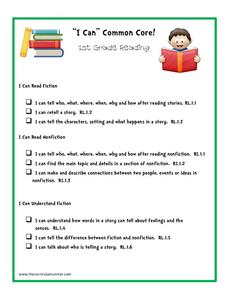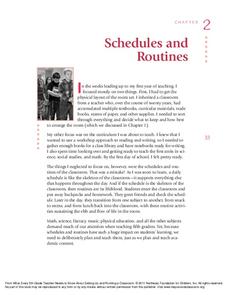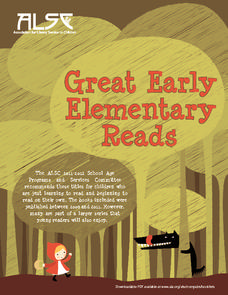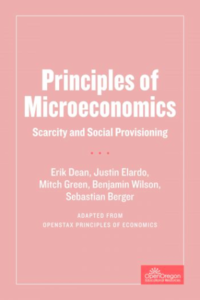Curated OER
“I Can” Common Core! 1st Grade Reading
I can read and understand fiction and nonfiction texts! Here is a great checklist that highlights 19 first grade Common Core reading standards. The resource is three pages long. Pages one and two focus on comprehension for fiction and...
Spring Branch Independent School District
Elementary Art Curriculum Guide
Get crafting with hundreds of pages of art lessons! The plans are organized into topics, which include clay, drawing, composition and design, mixed media, painting, printmaking, and paper.
Lane Community College
Review Sheets: Geometry
Full of problems with polygons, angles, lines, and triangles, your learners get a multi-page packet that provides all they need to know. It contains many of the standard problem types as well as some more challenging questions.
Curated OER
Native Americans of the Chesapeake Bay: Using Primary vs. Secondary Sources
Discover the rich Native American culture that existed at the time of early European exploration into the Chesapeake region through analysis of several primary and secondary sources.
Cornell University
Buoyancy
Swimmers know to float by turning their bodies horizontally rather than vertically, but why does that make a difference? In an interesting instructional activity, scholars explore buoyancy and the properties of air and water. They test...
Charanga
Sing!
Whether new to the Kodály Method of music instruction or an experienced veteran, you'll find much to make your heart sing in a teacher guide that was designed for a music appreciation project.
Waterford Union High School
Writing the Persuasive Essay
An excellent, in-depth resource would be an asset to your unit on writing an argument essay. It provides an explanation to each part of the essay as well as examples of transition words to strengthen your kids' writing. Additionally, the...
University of Southern California
Persecution of the German-Jews: The Early Years - 1933-1939
Young historians learn about the dehumanization process of stripping German Jews of basic, fundamental rights prior to the genocide of European Jews in the 1940s. Learners watch video clips of survivors who recount such events...
Carolina K-12
Are You a Democrat or a Republican? Are You Really?
Have new or soon-to-be voters examine different political parties and their platforms as they figure out which one aligns most with their beliefs. After taking a few online quizzes, students split into pairs to discuss and then...
Council for Economic Education
Satisfaction Please! (Part 2)
Simply understanding consumer rights may not help people solve their problems. Understanding who to turn to becomes key in many different scenarios. Teach the value of various organizations that fight for consumer rights through...
Northeast Foundation for Children, Inc.
Schedules and Routines: Grade 5
Before diving head first into the year's curriculum, take time to establish clear routines and procedures for your classroom. Starting with how to set up a class schedule that meets the needs of fifth grade learners, this sample...
American Library Association
Great Early Elementary Reads
Here is an excellent reference list of over 60 recommended book titles for early readers, each of which includes the author, title, number of pages, and brief summary.
Captain Planet Foundation
Help a Sister Out: Garden Companions
Explore Native American gardening traditions with a lesson on companion planting. Based on the concept that certain crops grow better when planted near other specific crops, kids research the gardening method with background links and by...
Chemistry Teacher
Metals, Nonmetals, and Metalloids Lab
What an exciting way to introduce your blossoming chemists to the world of metals, nonmetals, metalloids, and polymers! Here is a lab activity that is designed to allow pupils the opportunity to visualize the reaction of metals,...
Open Oregon Educational Resources
Principles of Microeconomics: Scarcity and Social Provisioning
There’s no such thing as a free economics course, but here's a resource that is as close as you can get. Drawing on the expertise of a textbook, augmented by input from higher education economics instructors, a helpful eBook presents a...
Broward County Schools
Women's Contributions to the United States
Betsy Ross, Toni Morrison, Sacajawea, Amelia Earhart, Maya Lin, Sally Ride, Judy Baca. No matter the subject area or the grade level you teach you will find much to value in a manual that focuses on the contributions U.S. women have...
English Exercises
Relative Pronouns
Provide your independent learner with some practice on relative pronouns. A brief explanation of when who, which, and whose is provided at the top of the screen before learners can scroll to two exercises. The first has them choose the...
Curated OER
Adjective Clauses Quiz: Who, Whom or Which
In this adjective clauses worksheet, students complete a 20 question quiz. Students fill in the blanks in sentences with "who" or "whom" or "which".
Evergreen State College
Physics: Motion
My acceleration is downward at 9.8 meters per second squared. That means I'm falling for this physics of motion instructional activity. Once motion has been covered in class, give a instructional activity that offers multiple...
Museum of Disability History
Adaptive Sports and Recreational Games
It's truly amazing how people with physical disabilities are able to find ways to overcome their impairments. Their tremendous perseverance is evident in this handout that describes the ways different sports, ranging from...
Infinite Dreams
Let's Create! Pottery HD
Using a potter’s wheel to make functional art is an experience not common to most people. Provide your learners with a chance to see what pottery making is all about with an app that allows them to create pots, fire them, decorate them,...
Curated OER
Who I Am Collage
Young scholars create a collage about themselves and their interests by using magazines and pictures. In this who I am lesson plan, students present their collage orally to their classmates.
Curated OER
Creative Problem Solving: Using the 5 W's (Who, What, Where, When, Why)
Third graders assimilate the use of the 5 W's (Who, What, Where, When, Why) when solving problems that are presented in literature and in real life situations. They use common fairy tales to solve problems that might arise at home or...
Novelinks
The Little Prince: Picture Book Strategy
Picture books aren't just for children; they carry strong, valuable messages for adult as well. Explore the audience for Antoine de Saint-Exupéry's The Little Prince with a lesson that compares picture books to literature...























